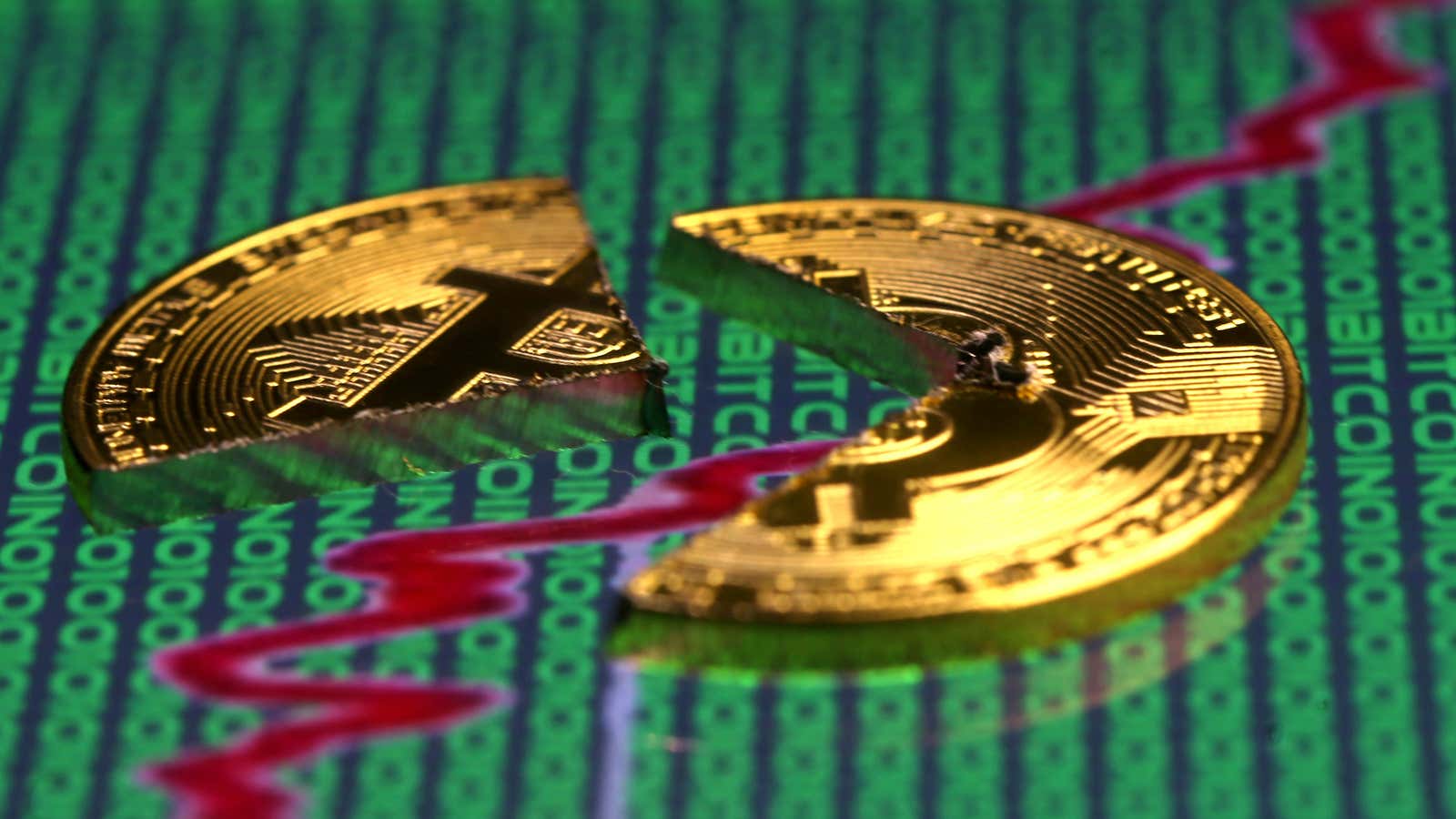It’s been a tough year for just about every currency except the US dollar. The euro and Swiss franc are down against the greenback, to say nothing of Argentina’s collapsed peso. But you know what’s faring even worse? Bitcoin. To find a currency that’s depreciated more against the dollar this year, you have to look to Venezuela’s bolivar, the near-worthless money printed by a hyperinflationary state.
The deepening bitcoin bear market is disappointing for crypto believers, and not just the speculators trying to get rich quick. Some hope that digital assets like bitcoin could give ordinary people in places like Argentina and Venezuela a way to protect their wealth. Instead of turning to black-market dollars, as is often the case now, citizens could convert their assets to digital tokens that would, theoretically, keep their value and be more difficult for officials to debase or confiscate.
So far, however, virtual coins are failing as money (pdf). Bank of England governor Mark Carney refers to digital tokens as “crypto assets” instead of currencies, because their volatility makes them such a poor store of value.
Stanford economist John Taylor (paywall) thinks that crypto tokens have potential in countries where policymakers have shipwrecked the domestic economy. The former US Treasury official is an advisor to Basis, a crypto project founded by Princeton computer science graduates.
Taylor is best known for his Taylor Rule, which policymakers use as a guide for setting interest rates to maintain price stability. He regularly consults with central bankers around the world and had a hands-on role in reconstructing Iraq’s currency after the US invasion 15 years ago.
Taylor thinks the token is an upgrade to bitcoin because it would be more steadfast. He says Basis’s ”algorithmic central bank” is consistent with his thinking on rules-based policy (pdf). Former Federal Reserve governor Kevin Warsh and hedge fund manager Stanley Druckenmiller are also backers of the project.
Basis is designed to remain stable against the dollar, or potentially a basket of other assets. Instead of pegging it to the US currency by holding dollars, as some so-called stable coins say they do, the supply of digital tokens is meant to expand and contract using a system that resembles the open market operations performed by central banks.
It does this using three tokens: basis tokens linked to the greenback, bond tokens that are auctioned by the blockchain, and share tokens. The system is as complicated as it sounds. You can read more about it here (pdf). Saga, a stable coin project backed economics Nobel laureate Myron Scholes, has similar ideas.
Naturally, people have questions. Will US regulators consider these tokens a security, for example?
One of the crypto community’s ambitions is to get away from the concentration of power (and single point of failure) that comes with centralization. If Basis relies on an exchange’s prices to make adjustments, it will have failed on this measure (more on this in the white paper). Financial crises—the subprime panic that started in the US, as well as Europe’s more recent sovereign debt crisis—have shown the need for creative, ad-hoc measures when markets go haywire. Can you rely on an algorithm for that?
Whatever the case, experiments like Basis are noteworthy. Bitcoin is a brilliant invention in terms of software and cryptography, but the embedded economic principles leave something to be desired if it is to become anything but a volatile, speculative asset. Could projects like Basis marry the technical genius behind bitcoin with sophisticated economic principles? At some point, crypto tokens might even prove more stable than the Argentinian peso or Turkish lira.
The future of finance on Quartz
- Square CFO Sarah Friar is more skeptical about bitcoin than her boss, Jack Dorsey, and she dreams of a day when machine learning will provide entrepreneurs with a mini-CFO inside their (virtual) cash register.
- Nobel prize-winning economist Jean Tirole discusses tech monopolies; he notes that breaking Facebook into five smaller Facebooks wouldn’t do much to address privacy concerns.
- Mt. Gox’s customers may end up with more money than they lost when the infamous bitcoin exchange collapsed in 2014.
- About 3,500 Swedes now contain surgically implanted biochips that can replace their wallets, among other things.
- The world’s first ATM machine was installed 51 years ago this week. Also in history, financial reporters routinely filed remarkably melancholic dispatches for market news.
The future of finance elsewhere
- Cheaper computing is helping upstart investment bankers (paywall) compete with Wall Street. Meanwhile, Wall Street stalwart Goldman Sachs has created a new team to compete with high-speed traders like Virtu. (The group presumably gets amped up by listening to Goldman president David Solomon’s electronic dance music.)
- A Bank of England regulator wrote to finance CEOs (pdf) to remind them of their obligations when they have exposure to digital assets. Crypto exchange Coinbase has a bank account with Barclays, while London Block Exchange has an account with ClearBank.
- A YouTuber says he gets paid the equivalent of about $5,000 to promote crypto projects. John McAfee has said he charged more than $100,000 per tweet to promote tokens.
- Iceland’s finance minister is worried about the risk bitcoin mining poses to the country’s economy.
- Kabbage says it has lent out $5 billion to businesses across the US, with $1 billion accessed during non-banking hours.
Previously, in Future of Finance Friday
June 22: Get ready for self-driving money
June 15: A philosopher thinks technology could make anarchists’ dreams come true
June 8: The Swiss are voting on the radical concept of “sovereign money”—the anti-bitcoin
